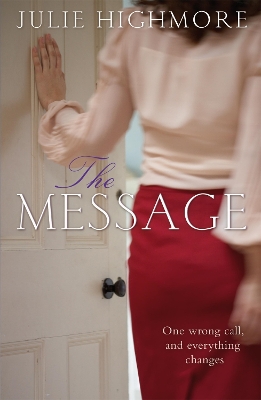
Leah
The Message is Julie Highmore’s eighth book but is described on the front cover, by the Bookseller, as her “breakout book”. Since I haven’t read Julie’s other seven books I can’t really say if this is better than her others however I’ve read a few synopses for her earlier books and The Message does sound as if it’s a bit of a departure from her earlier books and thus, probably is her breakout book of sorts. I really enjoyed reading The Message and I can see why all of the magazines and publishing sites are raving about the book.
The book opens as Jen is listening to a message from her husband Robert, a message that was supposed to go to his gay boyfriend, and the message changes her life. Jen’s learning of Robert’s cheating sends her into a bit of a spiral that ends in her feeling incredibly lonely and as if her life will never be the same again. We then cut to Kit in Norfolk and we find out his brother Pip has gone missing. It adds a lot of intrigue to the book and we then go back to Germany in 1969 and the summer in which Kit and Jen fall in love. The book then alternates chapters from Jen’s present point of view, Kit’s present point of view and the summer in Germany in 1969. The changes of perspective are done seamlessly and I found all three perspectives interested me.
The book spends a lot of time in 1969 at the airbase in Germany and that particular summer in which Kit and Jen fall in love. There was an air of mystery surrounding the whole summer in Germany and I couldn’t wait for the reveal to find out what had happened to cause Kit and Jen to never see each other again. Everything we learn about living on an airbase in the 1960’s seemed genuine and I really felt as if I was living in that airbase alongside Kit and Jen. It was easy to see how easily Jen fell in love with Kit and it definitely came across to me that Jen loved Kit more than Kit loved Jen. Jen and Kit’s relationship always seemed doomed from the start, though, and Kit’s mother, Mrs Avery, seemed determined to break them up for reasons I still fail to truly understand. My whole enjoyment of the book was going back to 1969 to carry on learning all about that fateful summer.
There weren’t many characters in the book as the main focus of the book was undoubtedly Jen and Kit. Their love in Germany was easily believable especially since they seemed to be each others first loves. In 1969 Jen had a naivety about her that was sweet and endearing and I loved the fact Kit was wise for his age and had his own views on things. The Kit and Jen of 2003 seemed a bit cynical about the whole love thing, Jen having discovered her husband was a gay adulterer and Kit never having settled down at all. It was a bit difficult to compare the Kit and Jen of 2003 to the Kit and Jen of 1969, the change in them was a bit surprising, but as the story unravels it all seems to make sense. The other characters I felt were integral to the book all seemed to be from 1969 rather than 2003. Mrs Avery, Kit’s mother, was ever present throughout the 1969 chapters and makes an appearance in 2003 also. I never really warmed to Mrs Avery and I always thought she came across as a bit of a cold fish. Mr Avery, Kit’s dad, makes a few appearances throughout the summer in Germany and I loved him whenever he appeared. I found it very difficult to see how a man like him, so sweet and kind, had married a woman like Mrs. Avery, prone to spitefulness and quite mean. The only main characters in 2003 seemed to be Kit’s nephew Adam, whom I liked, as well as his brother (and Adam’s dad) Pip. Pip, however, is missing for most of the book but he did seem to be an integral to the story particularly since everything that happened in 1969 affected him also.
Julie Highmore’s writing is very clever as while I found the book to move at quite a slow-pace I did actually find it a very absorbing read and I found myself dying to know what had happened. That was obviously down to how good Julie is at crafting a story. When I first started reading the book I never guessed I’d enjoy it as much as I did and I can’t get over how good it was. It may not be a fast-paced book nor have a heroine in her twenties but it is a good old-fashioned story and is definitely worth a read. Julie Highmore has managed to create such a fantastic past for her characters which as the book goes on becomes more and more intriguing until you’re bursting to know what had happened. I love it when I start reading a book and have no real idea how much I’m going to love it until I’ve turned the last page and find that, actually, I could go on reading another 400 pages!
